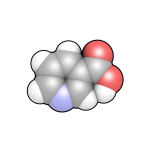 In a study published in the New England Journal of Medicine, a time release version of an inexpensive Vitamin B (Niacin- not niacinamide) was compared to a common cholesterol drug, ezetimibe (trade name Zetia), made by Merck. The vitamin gave superior results.
In a study published in the New England Journal of Medicine, a time release version of an inexpensive Vitamin B (Niacin- not niacinamide) was compared to a common cholesterol drug, ezetimibe (trade name Zetia), made by Merck. The vitamin gave superior results.
In 2008, 9 million Americans were taking Zetia versus just 2.5 who were taking niacin, putting the majority at higher risk for stroke and spending more money for their treatment.
Niacin is easier on the blood vessel walls. Niacin had a beneficial effect on the plaque buildup in the walls of the arteries that supply blood to the brain, while Zetia caused a slight worsening. Nine patients taking Zetia had heart attacks, stroke, or died from heart disease, versus just two patients taking niacin.
Niaspan, the niacin used in the study is a prescription product that has a special timed-release formulation, which may cut down on the hot flashes that are associated with niacin use. It does still cause flushing in some people however.
Zetia reduced LDL, the so-called bad cholesterol by 20%. But unlike Zetia, niacin boosts HDL, or good cholesterol by 20%, as well as reducing LDL by 16%, total cholesterol by 10% and triglycerides by 28%.
The prescription version of niacin is Niaspan, a 500mg-1000mg version taken at two tablets in the evening. The vitamin does cause flushing, but less so than straight niacin. Niacinamide (also called nicotinamide or “no flush niacin”) does not work the same way, although it is often used as a substitute for niacin in multivitamins.
Niacin can cause blood sugar to rise, may be contraindicated for people with gout, bleeding, stomach ulcers, liver disease, kidney problems and shouldn’t be taken by heavy drinkers or people on blood thinners. IT has not been studied on pregnant or nursing women but most likely does get into the breastmilk and should be monitored. The most common side effects include flushing, headache, diarrhea, nausea, vomiting, increased cough, and itching. It may interact with aspirin. I suspect that it may increase hot flashes for menopausal women due to the similarity of the symptoms and Chinese medicine interpretations, but Abbot has not mentioned that side effect. If you take other cholesterol medication take it 4 hours apart.
While the form used in the study is only available by prescription, Natrol sells a 500mg time release niacin for $7.33 for 100 pills and there are likely many other vendors. The Abbot Labs site says that there may be liver problems when changing to a long-term time release from a non or intermediate time release niacin, so if you are changing brands of niacin, spend a few days without it. Start at 500mg once a day and go up slowly. Do not exceed 2000mg. Women may need lower doses than men.
If you are severely yin deficient this may make things worse and it should be combined with shatavari, or the Rhemannia 6 herbal formula (Liu wei di huang wan). Speak with your acupuncturist or herbalist.
If you are on a statin, there is no extra benefit to taking niacin or vice versa. Incidentally the anti-inflammatory effect of two cups of coffee a day or a half pint of blueberries is the same as a statin, but the latter do not deplete your muscles of Coenzyme Q10.
Sources:
http://abcnews.go.com/Health/HeartDiseaseNews/cheap-niacin-beats-pricier-zetia-heart-patients/story?id=9092855
http://blogs.healthfreedomalliance.org/blog/2010/02/05/vitamin-proves-better-then-big-pharma-drug/
http://rxabbott.com/pdf/niaspan.pdf
http://www.niaspan.com/AboutNiaspan/Default.aspx#isi
See Also:
Coffee Beats Statin in Reducing Diabetes Inflammation
